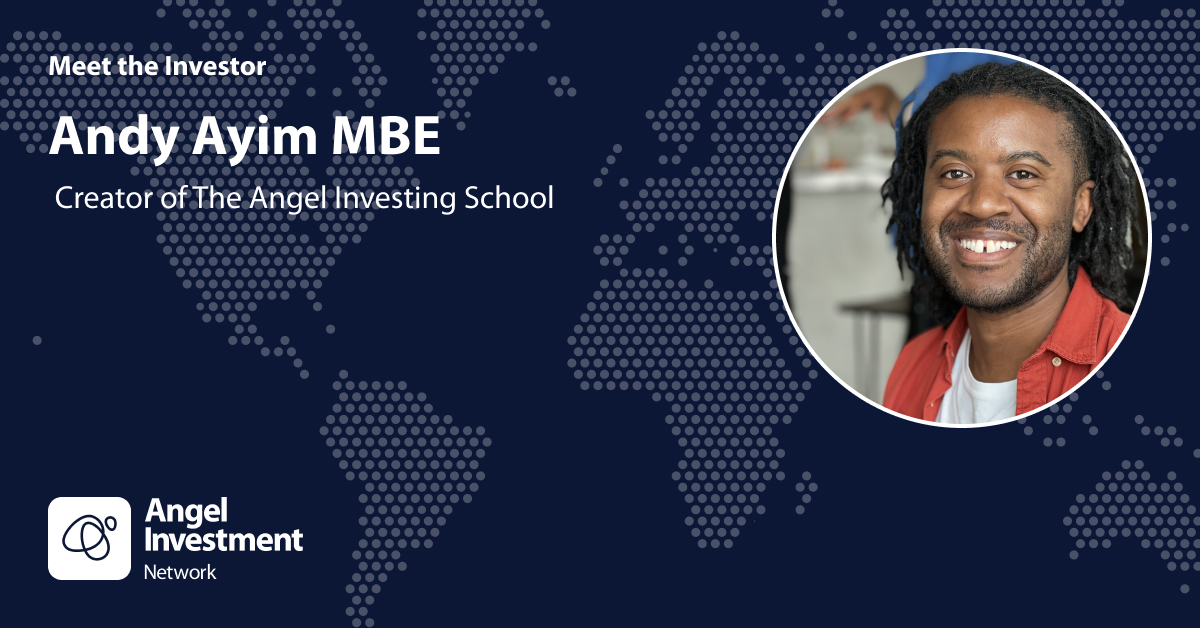“If you don’t see it, you can’t be it” says inspirational investor and founder Andy Ayim MBE. The quote describes his philosophy in setting up the Angel Investing School with the aim of empowering a new tribe of diverse angel investors for the benefit for the whole startup ecosystem. In our latest interview this game changing investor discusses his motivations, advice to aspiring angel investors, how he finds deals and where the best investment opportunities lie in this tougher climate.
What has led you to angel investing?
I was inspired to invest into startups because I met so many working class, diverse founders who lacked access to knowledge, networks and capital. Many didn’t have friends and family members who could invest in them despite having great skills, ideas and unlocked potential.
You started Angel Investing School in 2020, with the aim of empowering a new tribe of diverse Angel Investors, levelling the playing field of investment and increasing the numbers of BAME investors. Why is this important to you?
“If you don’t see it, you can’t be it.” Role modelling is important for empowering people to feel like they belong. Whether in school, at work or within an industry. The more diverse investors we have, the more diverse founders will get funded and have the opportunity to execute on their ideas.
You recently operated as a syndicate, investing with 8 other black investors (some new and some experienced angels) into a Consumer startup. What do you feel the benefits are to startups taking on funding from a syndicate?
Syndicates put simply are a collection of people that come together around an aligned area of interest. For a startup, this is great as they get to tap into the collective knowledge and networks of the group as well as efficiently managing their fundraise. Often the angels that invest small tickets, work hardest on the Cap Table to support founders and add value.
For the investors it is also great as it allows for small ticket investors to club together and cumulatively invest a larger amount into a startup. It democratises access to startup investing so that you could build a portfolio by investing £1,000 – £5,000 in each startup.
How did you find your first 2-3 deals and do you have any advice to aspiring angel investors who want to find their first deal?
The industry-wide challenge around inclusivity is that some of the best deals often get shared from founders and investors through private networks. The majority of new angel investors don’t have access to those networks.
Therefore, I highly encourage new angels to surround themselves with more experienced investors. That’s what I did as I joined syndicates such as HoaQ Club, HERmesa and Green Angel Syndicate as well as building relationships with individual angels.
The great thing is, you learn a lot from mistakes and just having skin in the game as an investor. Then your reputation starts working for you if you are responsive and helpful to the founders you invest in. That makes it more likely for them to recommend you to other founders in their network.
We understand every project is different but looking at your career of investing, with the startups you back how many conversations do you have on average from first conversation before signing a contract?
Like you mention, no two situations are the same. One thing I will say is that I don’t give in to FOMO. If I get a deal on a Friday that closes on a Monday, I simply say no as I need time to nurture a relationship and understand the founder and vice versa so they can get to know me.
I can usually do this with 3-5 meetings but some founders I know for over a year before committing too.
Our research shows that one of the biggest bugbears of entrepreneurs fundraising is the amount of time it takes from the initial conversation to signing the contract. What advice would you give to entrepreneurs going through the process?
The tech industry over indexes on intelligence and being smart. In reality, entrepreneurship is more about perseverance, grit and luck. Fundraising is hard work for most, there is no shortcut.
However, it should also be a great learning experience to on positioning, selling and storytelling. Most founders I speak to get better at this with time. I highly encourage founders to speak to other founders they trust who have previously fundraised as they are often an invaluable source of advice.
In this more challenging climate, what new hurdles do entrepreneurs need to overcome to win investment?
The current environment has seen a resetting of valuations, return to fundamentals (profit, revenue, unit economics etc) and capital efficiency. Any business, built on this as a foundation is off to a solid start.
Founders will need to foster relationships and play the long game with investors to build trust and show they have a plan to survive and thrive throughout this climate. Gone are the days for now of investing in scooters or deep tech companies with no clear business model.
Similarly, what are the best investment opportunities for angel investors in this tougher climate?
Angel investors should remain discipline and hone in on startups that fit their investment thesis. This environment favours certain sectors more than others. We have seen layoffs in particular with Buy Now, Pay Later and speedy grocery companies. Why? Because consumer behaviour has shifted and discretionary spending has been cut.
Founders that understand the terrain they are operating in and how they have adjusted their plans accordingly are the right ones to consider investing in – in this climate.
Join the world’s largest angel investment network, where global angel investors meet the great businesses of tomorrow.

